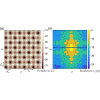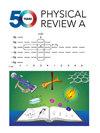Modification of the Bose-Hubbard model parameters in an optical lattice by two-particle Wannier functions
IF 2.9
2区 物理与天体物理
Q2 Physics and Astronomy
引用次数: 0
Abstract
In systems with periodic potential fields, building relatively local Wannier functions can significantly simplify the Hamiltonian and enhance our understanding of the system's ground state and dynamic properties. In this work, we improve the current method of building the Wannier functions of ultracold atomic systems, including the case in the presence or absence of interactions. In noninteracting systems, we propose a method to directly obtain the real-valued maximally localized Wannier functions (MLWFs) by using real-valued eigenstates, and verify the effectiveness of this method in a two-dimensional (2D) degenerate system. In interacting systems, we obtain the effect of high-energy bands on the lowest-energy band by using the accurate calculation results of the two-particle system. In the two-particle system, we consider the effect of the entanglement between the particles and obtain the optimal two-particle Wannier functions. These Wannier functions are then further utilized to obtain the parameters of the extended Bose-Hubbard model. The effectiveness of the method is verified by taking a one-dimensional (1D) system with contact interaction as an example. In the three-particle and four-particle systems, compared calculation results with the original system and the unmodified two-band Bose-Hubbard model, we find that the effective Hamiltonian is more accurate than the unmodified two-band model. This verifies the effectiveness of our method, and the parameters obtained can reflect the original system well, which provides an effective method for accurate modeling of interacting systems.

通过双粒子万尼尔函数修改光晶格中的玻色-哈伯德模型参数
在具有周期势场的系统中,建立相对局部的万尼尔函数可以大大简化哈密顿方程,加深我们对系统基态和动态特性的理解。在这项工作中,我们改进了当前构建超冷原子系统万尼尔函数的方法,包括存在或不存在相互作用的情况。在非相互作用系统中,我们提出了一种利用实值特征状态直接获得实值最大局部万尼尔函数(MLWFs)的方法,并在一个二维(2D)退化系统中验证了这种方法的有效性。在相互作用系统中,我们利用双粒子系统的精确计算结果,得到了高能带对最低能带的影响。在双粒子系统中,我们考虑了粒子间纠缠的影响,得到了最优的双粒子万尼尔函数。然后进一步利用这些万尼尔函数来获得扩展玻色-哈伯德模型的参数。以具有接触相互作用的一维(1D)系统为例,验证了该方法的有效性。在三粒子和四粒子系统中,将计算结果与原始系统和未修改的双波段玻色-哈伯德模型进行比较,我们发现有效哈密顿比未修改的双波段模型更精确。这验证了我们方法的有效性,得到的参数能很好地反映原始系统,为相互作用系统的精确建模提供了一种有效的方法。
本文章由计算机程序翻译,如有差异,请以英文原文为准。
求助全文
约1分钟内获得全文
求助全文
来源期刊

Physical Review A
物理-光学
CiteScore
5.40
自引率
24.10%
发文量
0
审稿时长
2.2 months
期刊介绍:
Physical Review A (PRA) publishes important developments in the rapidly evolving areas of atomic, molecular, and optical (AMO) physics, quantum information, and related fundamental concepts.
PRA covers atomic, molecular, and optical physics, foundations of quantum mechanics, and quantum information, including:
-Fundamental concepts
-Quantum information
-Atomic and molecular structure and dynamics; high-precision measurement
-Atomic and molecular collisions and interactions
-Atomic and molecular processes in external fields, including interactions with strong fields and short pulses
-Matter waves and collective properties of cold atoms and molecules
-Quantum optics, physics of lasers, nonlinear optics, and classical optics
 求助内容:
求助内容: 应助结果提醒方式:
应助结果提醒方式:


